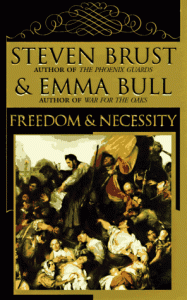 I think I may be getting bad at this. At least, lately I’ve been at a loss for descriptive words. In this case, my lack is for how to describe Freedom and Necessity, other than to say I liked it. I did, unquestionably, despite being of an insufficiently philosophic mind (or at the least insufficiently grounded in the basics of philosophic thought) to understand all of the historical nuances of the debates around Hegelian logic. …see, and this is exactly what I mean. Although Brust is very good at writing books that make me feel inadequate to fully appreciate them, that’s no excuse for me to make them sound like dry treatises with dense and well-disguised themes when I could as easily and far more approvingly describe them as rousing tales of adventure and skullduggery. So, y’know, bad. At this. (Also, I’m disregarding Emma Bull’s contribution to my enjoyment, but that is only because I’ve read nothing else by her and as a result can’t really put together in my head what that contribution was.)
I think I may be getting bad at this. At least, lately I’ve been at a loss for descriptive words. In this case, my lack is for how to describe Freedom and Necessity, other than to say I liked it. I did, unquestionably, despite being of an insufficiently philosophic mind (or at the least insufficiently grounded in the basics of philosophic thought) to understand all of the historical nuances of the debates around Hegelian logic. …see, and this is exactly what I mean. Although Brust is very good at writing books that make me feel inadequate to fully appreciate them, that’s no excuse for me to make them sound like dry treatises with dense and well-disguised themes when I could as easily and far more approvingly describe them as rousing tales of adventure and skullduggery. So, y’know, bad. At this. (Also, I’m disregarding Emma Bull’s contribution to my enjoyment, but that is only because I’ve read nothing else by her and as a result can’t really put together in my head what that contribution was.)
So, I grabbed this book because of how Steven Brust is one of my buy on sight authors, these days. He is right to be, because of how everything I’ve read of his has a great authorial voice, humor that makes me laugh out loud[1], and plots that, though sometimes dense, always seem to hinge on exciting matters of life and death (and on occasion far more grave) that are guaranteed suck me in. As you might expect, this was just such a book.
Set in 1849-1850 England, this epistolary novel follows the loves and politics of a family that has just been struck by tragedy in the form of drowned James Cobham. Except that, two months later, he sends a letter to his cousin Richard informing that he is alive and without memory of his recent past. From there, the story quickly branches out to the addressing of that conundrum and a number of other family mysteries, the struggle between the proletariat and its oppressive masters, affairs of state, a magical conspiracy, blossoming love, and of course murder most foul. Allowing one of the characters eidetic memory combined with a penchant for writing letters long enough dam the Thames was perhaps overly transparent of the authors, but the unique and entertaining voices of all four main characters (one of whom cannot end a sentence to save her life) more than made up for that lone violation of my suspension of disbelief.
[1] I’ll admit here that I might seem to some people to laugh easily; to those people I would say that in fact I have a highly refined sense of humor, but choose to surround myself with people and things that activate it. So there.
Pingback: Freedom and Necessity revisited | Shards of Delirium